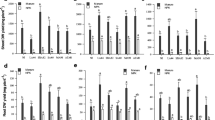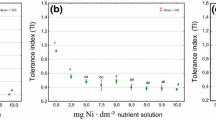Abstract
A greenhouse experiment was conducted to study the effect of the plant growth promoting rhizobacterium Pseudomonas fluorescens 20 on spring wheat productivity in agrogray soil artificially contaminated with a water-soluble nickel compound. Plants were grown until the booting stage; NPK fertilizers and NiCl2⋅6H2O were applied to soil. The contaminant application rate was 300 mg Ni/kg soil, which significantly exceeds its maximum permissible concentration in soils. The chemical composition of plants and the uptake of nickel and nutrients from soil by shoots and roots were examined. Concentrations of Ni and other ash elements were determined after wet combustion of plant samples using inductively coupled plasma optical emission spectrometry and flame photometry. The nitrogen content in plants was determined using the phenol method. Bacterial inoculation increases the resistance of plants to toxic effects of the heavy metal, which is expressed in the higher weight of their vegetative organs and roots in contaminated conditions. Simultaneously the mineral nutrition of spring wheat improves, and the from soil by the plants increases; apparently, this manifests their protective response to soil contamination with Ni. The general growth promotion observed in bacterially inoculated plants is not accompanied by significant changes in the content of elements in their shoots and roots. The application of the bacterium intensifies Ni phytoextraction from soil (i.e., soil purification from the heavy metal) and the Ni uptake by roots without significant changes in its concentration in shoots and roots. The amounts of metal accumulated in roots exceed those accumulated in shoots by an order of magnitude. Regardless of bacterial inoculation, soil contamination with Ni increases the content of Mg and some other nutrients in shoots and roots of plants.
Similar content being viewed by others
REFERENCES
Neitralizatsiya zagryaznennykh pochv (Neutralization of Contaminated Soils), Mazhaiskii, Yu.A., Ed., Ryazan: Vseross. Nauchno-Issled. Inst. Gidrotekh. Melior., 2008.
Handsa, A., Kumar, V., Anshumali, A., et al., Phytoremediation of heavy metals contaminated soil using plant growth promoting rhizobacteria (PGPR): a current perspective, Recent Res. Sci. Technol., 2014, vol. 6, no. 1, pp. 131–134.
Anokhina, T.O., Siunova, T.V., Sizova, O.I., et al., Rhizosphere bacteria of the genus Pseudomonas in modern agrobiotechnology, Agrokhimiya, 2018, no.10, pp. 54–66.
Chandel, A.K., Chen, H., Ch. Sharma, H., et al., Beneficial microbes for sustainable agriculture, in Microbes for Sustainable Development and Bioremediation, Chandra, R. and Sobti, R.C., Eds., Boca Raton: CRC Press, 2019.
Dorjey, S., Dolkar, D., and Sharma, R., Plant growth promoting rhizobacteria Pseudomonas: a review, Int. J. Curr. Microbiol. Appl. Sci., 2017, vol. 6, no. 7, pp. 1335–1344.
Kalita, M., Bharadwaz, M., Dey, T., et al., Developing novel bacterial based bioformulation having PGPR properties for enhanced production of agricultural crops, Indian J. Exp. Biol., 2015, vol. 53, no. 1, pp. 56–60.
Burd, G.I., Dixon, D.G., and Glick, B.R., A plant growth-promoting bacterium that decreases nickel toxicity in seedlings, Appl. Environ. Microbiol., 1998, vol. 64, no. 10, pp. 3663–3668.
Farwell, A.J., Vesely, S., Nero, V., et al., The use of transgenic canola (Brassica napus) and plant growth-promoting bacteria to enhance plant biomass at a nickel-contaminated field site, Plant Soil, 2006, vol. 288, nos. 1–2, pp. 309–318.
Farwell, A.J., Vesely, S., Nero, V., et al., Tolerance of transgenic canola plants (Brassica napus) amended with plant growth-promoting bacteria to flooding stress at a metal-contaminated field site, Environ. Pollut., 2007, vol. 147, no. 3, pp. 540–545.
Shabaev, V.P., Soil-agrochemical aspects of remediation of a gray forest soil polluted with Pb upon the application of growth-promoting rhizobacteria, Eurasian Soil Sci., 2012, vol. 45, no. 5, pp. 539–549.
Shabayev, V.P., Bocharnikova, E.A., and Ostroumov, V.E., Remediation of cadmium-polluted soil using plant growth-promoting rhizobacteria and natural zeolite, Eurasian Soil Sci., 2020, vol. 53, no. 6, pp. 809–819.
Shabayev, V.P., Mineral nutrition of plants inoculated with plant growth-promoting rhizobacteria of Pseudomonas genus, Biol. Bull. Rev., 2012, vol. 2, no. 6, pp. 487–499.
Brahmaprakash, G.P., et al., Beneficial role of rhizosphere microbes on plants, in Plant-Microbe Interactions in Agro-Ecological Perspectives, Vol. 1: Fundamental Mechanisms, Methods and Functions, Ch. 10: Microbial Functions of the Rhizosphere, Singh, D.R., Singh, H.B., and Prabha, R., Eds., Singapore: Springer-Verlag, 2017, ch. 10.4, pp. 185–189.
Tank, N. and Saraf, M., Enhancement of plant growth and decontamination of nickel-spiked soil using PGPR, J. Basic Microbiol., 2009, vol. 49, no. 2, pp. 195–204.
Ma, Y., Rajkumar, M., Luo, Y., et al., Inoculation of endophytic bacteria on host and non-host plants—Effects on plant growth and Ni uptake, J. Hazard. Mater., 2011, vol. 195, pp. 230–237.
Kaznina, N.M. and Titov, A.F., The influence of cadmium on physiological processes and productivity of Poaceae plants, Biol. Bull. Rev., 2014, vol. 4, no. 4, pp. 335–348.
Rajkumar, M. and Freitas, H., Effects of inoculation of plant-growth promoting bacteria on Ni uptake by Indian mustard, Bioresour. Technol., 2008, vol. 99, no. 9, pp. 3491–3498.
ACKNOWLEDGMENTS
We are grateful to the Center of Collective Usage of the Institute of Physicochemical and Biological Problems in Soil Science, Russian Academy of Sciences, for determination of ash elements in solutions.
Funding
This study was performed as part of the State Assignment Physicochemical and Biogeochemical Processes in Anthropogenically Altered Soils, projects no. AAA-A-A18-118013190180-9 and AAA-A18-118013190181-6.
Author information
Authors and Affiliations
Corresponding author
Ethics declarations
The authors declare that they have no conflict of interests. This article does not contain any studies involving animals or human participants performed by the authors.
Additional information
Translated by L. Emeliyanov
About this article
Cite this article
Shabayev, V.P., Ostroumov, V.E. Growth and Mineral Nutrition of Spring Wheat Inoculated with Plant Growth Promoting Rhizobacterium in Soil Contaminated with Nickel. Russ. Agricult. Sci. 47, 601–605 (2021). https://doi.org/10.3103/S1068367421060112
Received:
Revised:
Accepted:
Published:
Issue Date:
DOI: https://doi.org/10.3103/S1068367421060112




